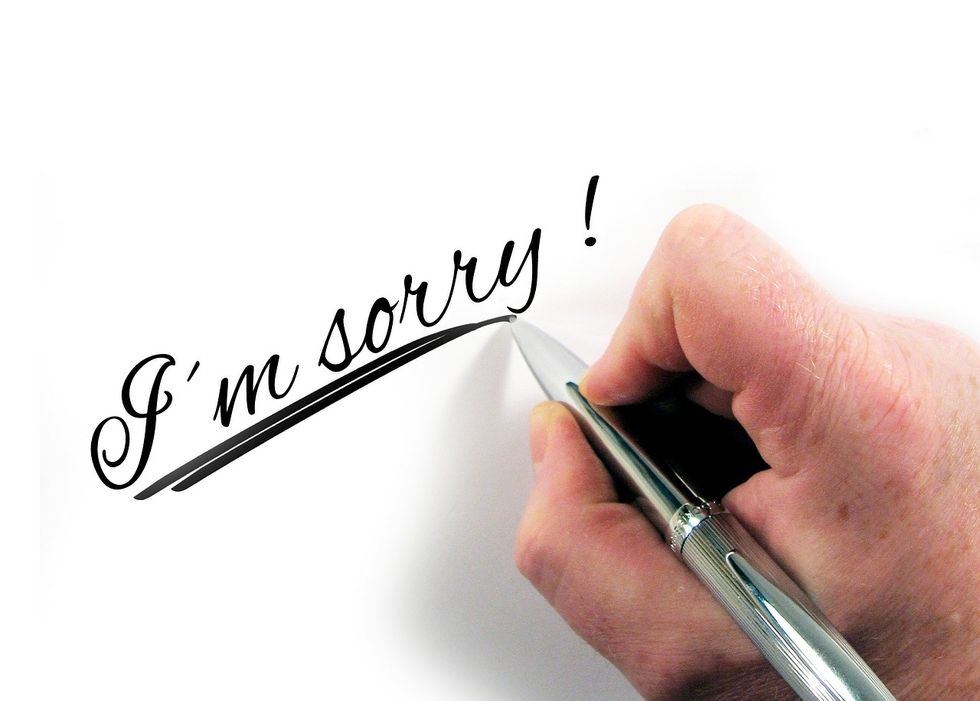"I'm sorry. "
If I earned a dollar for everytime I've said that phrase, I'd be the next millionaire. I said this after everything, from bumping into inanimate objects to when someone bumps into me by accident. The moment is too awkward without someone apologizing, right? Regardless, "Sorry" is my word of choice and though sometimes it can be used as a bandaid, it is a polite thing to say. "Sorry" and other demonstrations of politeness are cues of social acceptance. In american culture specifically, it also is a marker for wanting a certain action to be reciprocated. My sorry's were never out of wanting something more (most times) but I was raised to be very very polite. In academia it won me a teacher's pet status and praise, but with my friends and peers it was a different story. I would hear it now and again from a few people in high school ("its okay," or "you don't HAVE to apologize" was usually the response) but truly, the more they told me that I didn't have to, the more I felt obligated to do so; I thought I had nothing else to offer besides my quiet, "polite" and empathetic demeanor.
I eventually was called out for my over-politeness in my freshman year of college.
I don't remember what exactly it was for, but I said my usual automatic response of "sorry" and the person I apologized to said "That's it, I'm not accepting your apologies." This was an interesting rebuttal instead of the usual "it's okay," followed by a weary, yet reassuring smile. It was a rejection of my polite buffer that I used to slightly absolve myself of guilt that I didn't even need to feel. It also challenged my urge to please people. After hearing that my apology was not accepted,I didn't know what to say but I'm pretty sure my mind went to saying sorry again. The one of the reasons why this person didn't accept my sorry was because in that instance, sorry wasn't a true measure of how I felt about the situation and this wasn't to say that I used sorry in a superficial manner, but sorry is probably one of the most used words by people who don't' really mean it,and are trying to get out of a sticky situation with minor consequences. It also is, again used to absolve one of guilt.
Women, especially, have always been held up to a standard of being polite enough to be attractive to the male gaze, and if they are assertive or unapologetic of their actions whether or not they are at fault, they're a bitch. White women especially have been poised as demure creatures needed to be protected by men, from black men especially. On the flipside, black women were the aggressive ones- animalistic and impolite in their actions and if they were "docile" it was under the supervision of a white person who would act superior to them. The darker the skin tone the more animalistic these depictions were and 2000s reality tv in the media did not make these deptions any better or less far from the truth.
This definitely had an impact on my need to be overly polite. A bold, loud and assertive personality did not sit well for a young black woman and my wanting to be accepted along with trying to reject the stereotypes associated with my race. affected how I was raised and how I carried that into my interactions with others. My mom always raised me to have "manners" whether it was in the classroom or at the table and I took it to heart. "People won't have a reason to like me unless I do something for them and if i mess up I have to do everything i can to get them to forgive me." This was my mentality and if you find yourself thinking this as well, you too might have a guilt complex about pleasing others.
But the most important person you have to please, is yourself. Of course, there's nuance to this I'm not saying to screw everyone else,it's all good as long as you're happy- that's just being a dick. But if you do something you believe is right and true and if you are standing up for yourself, and speaking up- then live your life unapologetically. Not everyone is gonna like what you do, and if you're looking to make everyone else happy, well you're SOL, because not everyone is going to like you anyways. But you can control your happiness and that phrase about loving yourself before you love anyone else is true in the sense that you most likely project how you feel towards others. Women should feel just as empowered to speak their truth without fear of being disrespected, or made into a gross caricature, that has become a cultural norm and expectation, even today.
I try to be my best self around anyone, especially towards close family and friends, and in order to keep doing that I will continue to be the best person I can be to me. This means changing the rate of my sorry's to on a solely need basis, which is way less than i would normally say to them. Also, I've been saying "I apologize" more often than sorry- it sounds more genuine and also I do feel like it means more since the connotation the word sorry has now is the equivalent of the value of the penny or a knicks jersey. But no matter how I apologize, these are only used when needed- not for guilt or for pleasing.- Replace 'I'm Sorry' With 'Thank You' ›
- What Does "Sorry" Mean To You? ›
- I'm Tired of Being Sorry For My Existence ›
- Sorry Syndrome: Why Do We Apologize So Much? ›



















